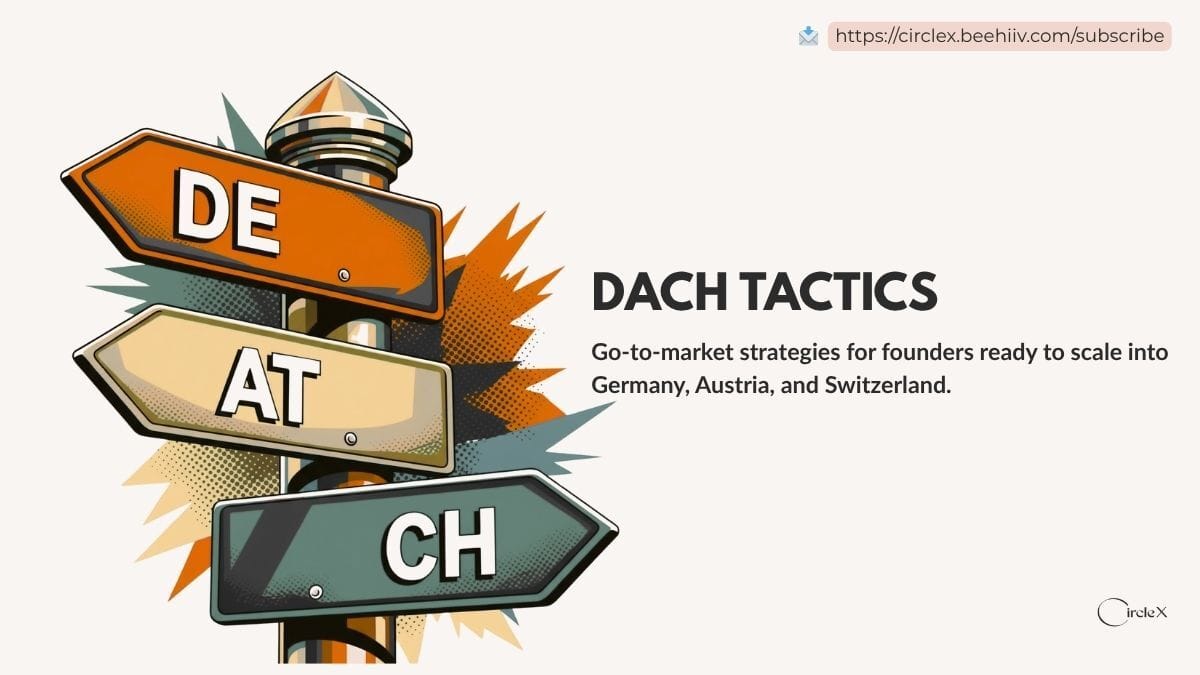- DACH Tactics
- Posts
- DACH Tactics #8
DACH Tactics #8
Associations Special: Why Membership Shapes Your GTM in Germany, Austria & Switzerland

Welcome to DACH Tactics - Associations Special
This week we’re doing a special edition. Because in DACH, associations aren’t just logos on your website. They’re either mandatory gateways if you set up a company or they’re the fastest way to get credibility, tenders, and warm intros.
In some countries (Germany, Austria) it’s compulsory: if you register a company, you automatically join the public-law Chamber of Commerce (IHK, HWK, or WKO).
But beyond the chambers, there are hundreds of private and sector-specific associations: tech, manufacturing, health, logistics, cybersecurity, and more. These memberships are voluntary, but they’re often where the real buyer access happens.
At the end of this edition, you’ll find a Scorecard to cut through the noise and pick the right ones.
Here’s what to expect today:
✅ 3 brutal truths about associations in DACH
✅ 1 scorecard to choose from hundreds of options
Let’s get started.
This Week’s 3 Brutal Truths
1️⃣ Germany: “Mandatory if you register”
Compulsory: If you register a German company (GmbH, UG, KG, AG), you automatically become a member of your regional Chamber of Commerce and Industry (IHK) or, if you run a regulated craft, the Chamber of Crafts (HWK). Membership fees are compulsory.
Not registered? If you only sell into Germany from abroad, no chamber dues. But many sector associations welcome foreign companies:
BITKOM: Associated membership possible for non-German entities.
BVMW: Accepts foreign firms active on the German market.
TeleTrusT: International membership common.
VDMA: Only if domiciled in Germany or another European state.
What German buyers think:
“If they’re not in the right association, are they really serious about this market?”
✅ What to do:
Budget for chamber fees if you set up a GmbH.
Add 1–2 sector associations where your ICPs are active.
Use directories and working groups for warm intros.
💡 Pro tip: German buyers scan association newsletters. Publish short articles there.
2️⃣ Austria: “Membership is law - if you open a company”
Compulsory: Every company registered in Austria automatically joins the Wirtschaftskammer Österreich (WKO). Dues are required by law.
Not registered? No membership obligation. But voluntary federations like the Industriellenvereinigung (IV) focus on Austrian operations, not purely foreign members.
Inside WKO: The Fachgruppen (specialized trade groups, e.g., UBIT for IT & consulting) are where tenders, trainings, and referrals circulate.
What Austrian buyers think:
“If they’re not inside WKO, they’re not legitimate.”
✅ What to do:
Register early and activate your Fachgruppe.
Show up at WKO trainings, directories, and pitch calls.
Add one reputation-heavy body (e.g., IV) once you have Austrian presence.
💡 Pro tip: In Austria, Fachgruppen membership can get you into closed-door dinners where real deals are made.
3️⃣ Switzerland: “Voluntary - but a credibility signal”
No compulsory chambers: Even if you register a Swiss entity, chamber membership is voluntary.
Strategic: Many associations set the tone for trust and visibility:
digitalswitzerland: Swiss entity required.
Swico: Case-by-case, open to ICT/digital companies.
Swissmem: Only for companies with HQ in Switzerland or Liechtenstein.
Cantonal chambers (e.g., Zurich): Corporate members expected to have local presence.
What Swiss buyers think:
“If they’re not part of our ecosystem, are they really committed to Switzerland?”
✅ What to do:
Choose 1 cantonal chamber if you have Swiss presence.
Add 1–2 sector groups (Swico, digitalswitzerland) once you register.
Sponsor content or panels - Swiss associations reward thought leadership.
💡 Pro tip: In Switzerland, voluntary membership is a stronger signal of commitment than in DE or AT.
Key Clarification
Chamber membership is only mandatory if you set up a local company in Germany or Austria.
If you only export or cooperate cross-border, membership is voluntary.
In Switzerland, all association memberships are voluntary (even with a local entity).
Beyond chambers, there are hundreds of private and sector-specific associations in DACH. They are voluntary, but often where the real buyer access happens.
Always research carefully: some associations explicitly allow foreign companies to join without a local registration, while others restrict membership to entities registered in that country.
This Week’s Edge Tool: The Association Fit Scorecard
Before paying any dues, run your options through this test:
Rate 1–5 on each point (max 25):
Buyer overlap: Will my ICPs be in the room?
Event quality: Do they host decision-maker-heavy events?
Policy relevance: Will I get early access to regulatory changes?
Content access: Can I publish, speak, or list in directories?
ROI potential: Can I trace pipeline to this membership within 12 months?
👉 Keep associations that score 18+. Drop the rest.
Closing note:
In DACH, associations are either legal gateways or pipeline multipliers. Joining isn’t the end goal. Activation is. Show up at events, speak, publish, and make the membership pay for itself in deals.
At CircleX, we help foreign companies entering DACH map their must-join vs. nice-to-have associations, secure memberships, and design visibility strategies that actually convert.
Trust builds quietly. So does reputation.
Let’s keep building, one membership at a time.
See you next week!